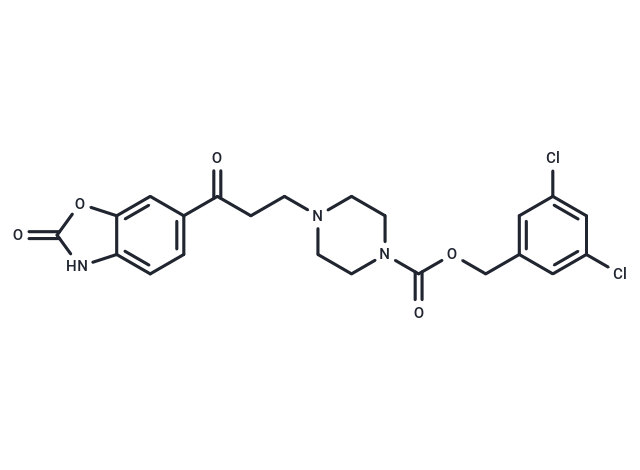Shopping Cart
- Remove All
 Your shopping cart is currently empty
Your shopping cart is currently empty

PF-8380 is an effective and orally available autotaxin inhibitor (IC50: 2.8 nM, in isolated enzyme assay; 101 nM, in the human whole blood). It modulates lysophosphatidic acid (LPA) levels in vivo/vitro by directly inhibiting autotaxin; reduces LPA levels both in plasma and at the site of inflammation.

| Pack Size | Price | Availability | Quantity |
|---|---|---|---|
| 10 mg | $38 | In Stock | |
| 25 mg | $83 | In Stock | |
| 50 mg | $137 | In Stock | |
| 100 mg | $223 | In Stock | |
| 200 mg | $329 | In Stock |
| Description | PF-8380 is an effective and orally available autotaxin inhibitor (IC50: 2.8 nM, in isolated enzyme assay; 101 nM, in the human whole blood). It modulates lysophosphatidic acid (LPA) levels in vivo/vitro by directly inhibiting autotaxin; reduces LPA levels both in plasma and at the site of inflammation. |
| Targets&IC50 | ATX:2.8 nM |
| In vitro | Pre-treatment with PF-8380 before radiotherapy can inhibit radiation-induced angiogenesis in tumor endothelial cells and delay the growth and development of intracranial glioma tumors. In a rat air pouch inflammation model, PF8380 (30 mg/kg, p.o.) reduced inflammatory pain sensitivity and decreased LPA levels in plasma and inflamed tissues by more than 95% within 3 hours. |
| In vivo | PF-8380 inhibits autotoxin in rat substrates (IC50: 1.16 nM) and demonstrates inhibition in human whole blood with an IC50 of 101 nM after 2 hours of treatment [1]. Furthermore, PF-8380 suppresses autotoxin in GBM cells, subsequently reducing their invasion and migration capabilities while enhancing radiation sensitization. |
| Kinase Assay | FS-3 substrate is solubilized in assay buffer at 500 μM and frozen at -20°C in single-use aliquots for up to 4 weeks. Recombinant autotaxin is diluted in Tris-buffered saline (140 mM NaCl, 5 mM KCl, 1 mM CaCl2, 1 mM MgCl2, 50 mM Tris, pH 8.0) and incubated with compound in DMSO or DMSO alone (final 1% DMSO) for 15 min at 37°C, and the reaction is started with the addition of FS-3 at a final concentration of 1 μM. The reaction is allowed to proceed at 37°C for 30 min and monitored at 520 nm until the uninhibited control compared with a no-enzyme control gave a Z′≥0.5. IC50s are determined in triplicate by using a four-parameter fit[1]. |
| Cell Research | GL261 or U87-MG cells are plated in triplicate onto 6 cm plates and allowed to grow to 70% confluence. The semi-confluent cell layer is scratched with a sterile 200 μL pipette tip to create a scratch devoid of cells and plates are washed once with PBS to remove non-adherent cells and debris. For radiosensitization drug studies, cells are treated with 1 μM PF-8380 or DMSO for 45 min prior to irradiation with 4 Gy, and then incubated at 37°C in 5% CO2. Control plates are monitored for cell migration (20–24 h). Cells are fixed with 70% ethanol and stained with 1% methylene blue. To quantify migration, cells in three randomly selected high power fields (HPFs) in the scratched area are counted and normalized for surrounding cell density.(Only for Reference) |
| Molecular Weight | 478.33 |
| Formula | C22H21Cl2N3O5 |
| Cas No. | 1144035-53-9 |
| Smiles | Clc1cc(Cl)cc(COC(=O)N2CCN(CCC(=O)c3ccc4[nH]c(=O)oc4c3)CC2)c1 |
| Relative Density. | 1.419 g/cm3 |
| Storage | Powder: -20°C for 3 years | In solvent: -80°C for 1 year | Shipping with blue ice. |
| Solubility Information | DMSO: <1 mg/mL (insoluble or slightly soluble) |

Copyright © 2015-2025 TargetMol Chemicals Inc. All Rights Reserved.